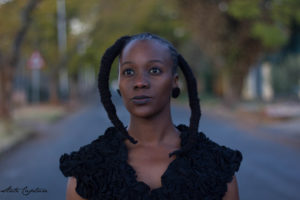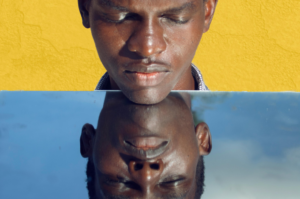
For Professor Harry Garuba
You are in a lime green, waterproof jacket
hooded.
Restlessly standing on the pavement—
overhead: grey concrete
around you: vapour—
on a street that resembles the Sunday-vacant ones in Jozi
(although, the dream calls the street Lagosian,
we tell it we believe it by continuing).
It is misty.
After you get off the taxi—
and I dither: allowing the danfo to travel with me
over the next street before I stop it—
I cross back over the Jozi-Lagosian street
to find you standing restlessly in lime-green.
(even with the minibus’s back to you,
You were never out of my sight)
I catch up to you.
Side-by-side we begin walking—
shoulders meet as you slouch
still hooded and vapoury.
We cross the same street,
walking parallel or perhaps adjacent to a bridge we ignore
(although, I notice the light it lets through between its concrete beams
then the mist darkened by the lack of sunshine we meet
on the other side of the road.)
We stop
in front of what feels like a hidden door
on the dark, damp wall.
You tell me that you have saved my number as Lindiwe,
that if she had called, you would have not known it was her.
I am relieved that I came to see you in person,
relieved at not risking you not picking up my call.
I do not say this.
You gesture towards your phone in the pocket of the raincoat
and I stall to reach back to correct the oversight.
(That is the end of this dream-scene.
In the next…)
We are sitting silently on a bed indoors.
You: no longer wearing your mist-coat
are crossed-legged, balancing my lilac pillow
in the triangular space between your feet, hips and knees.
You pull the pillow close to you
and I think: “Do you know all the wonderful messages people have written and posted about you since your passing?”
and you are gleefully colouring my pillow on the side I can see
I watch how its lilac turns black.
A pale-voiced student of yours,
whose face I cannot see is now in our presence.
standing.
She tells you that you are selfish for not making contact
with the world and those who love you
to her it is obvious you know how to.
Your response to her helps me follow:
you know all about the emails, posts and voice-notes.
You know how we called you a gentle, smiling, intellectual.
I do not have to tell you this and I am thankful
because I am reluctant to speak it so.
Across the room
people I cannot see
and to whom you have your back faced,
are preparing a meal.
White porcelain dishes are placed inside
the squares of a yellow and red tie-dyed cloth
laid over the long, wooden tables.
I sit calmly,
watching an invisible but Cape Malay or Cape Coloured woman
place a round oven-proof container on the last square closest to us.
I sit watching, not feeling guilty for not helping my elder,
feeling sure that my role is to sit with you
and wait together before we feast later.
I am now awake, in Jozi.
It is 5am.
I have just turned the geyser on and instead of napping again
I am lighting a white candle with two wicks
inside a bronze container: metallic.
I am praying for you.
Prayer is interrupted by a mashup of Asa’s “Fire on the Mountain” and “Moving On”
a postcolonial lesson on how the fire precedes water and how the water can mean drowning or healing.
My prayer and music are washed-over by me talking to you—
switching between English, flashbacks and Sesotho.
I do not hesitate.
I am certain you can hear me.
I am calling you by name.
You are now my ancestor too.
And in the absence of your totem or clan-name,
one of the things I say:
“Robala ka lethabo Moholo”
How you regarded my reluctance and silence
and trekked across your pains
tells me you already know peace
so I wish more merriment for you.
ABOUT THE AUTHOR
 Katleho Kano Shoro is a performance poet, author of “Serurubele” (Modjaji Books 2017), and a freelance researcher who holds a Masters degree in Social Anthropology. She has performed in South Africa, Ghana, Burkina Faso, Zimbabwe, USA and London as well as participated and facilitated in southern African literary festivals. Shoro contributed to the girl-centred colouring book with poems, “Colour Me Melanin” (2019). Shoro is the co-editor of The Spoken Word Project: “Stories Travelling through Africa” (2015) and her poetry has been published in journals internationally. Her work in the arts extends to research, guest-lecturing, facilitating workshops and managing projects. Currently, Shoro is teaching poetry and applied drama at high school-level and serves as a core member of the NRF-funded project: South African Poetry Project (ZAPP).
Katleho Kano Shoro is a performance poet, author of “Serurubele” (Modjaji Books 2017), and a freelance researcher who holds a Masters degree in Social Anthropology. She has performed in South Africa, Ghana, Burkina Faso, Zimbabwe, USA and London as well as participated and facilitated in southern African literary festivals. Shoro contributed to the girl-centred colouring book with poems, “Colour Me Melanin” (2019). Shoro is the co-editor of The Spoken Word Project: “Stories Travelling through Africa” (2015) and her poetry has been published in journals internationally. Her work in the arts extends to research, guest-lecturing, facilitating workshops and managing projects. Currently, Shoro is teaching poetry and applied drama at high school-level and serves as a core member of the NRF-funded project: South African Poetry Project (ZAPP).









Rato June 14, 2021 09:49
I love this!